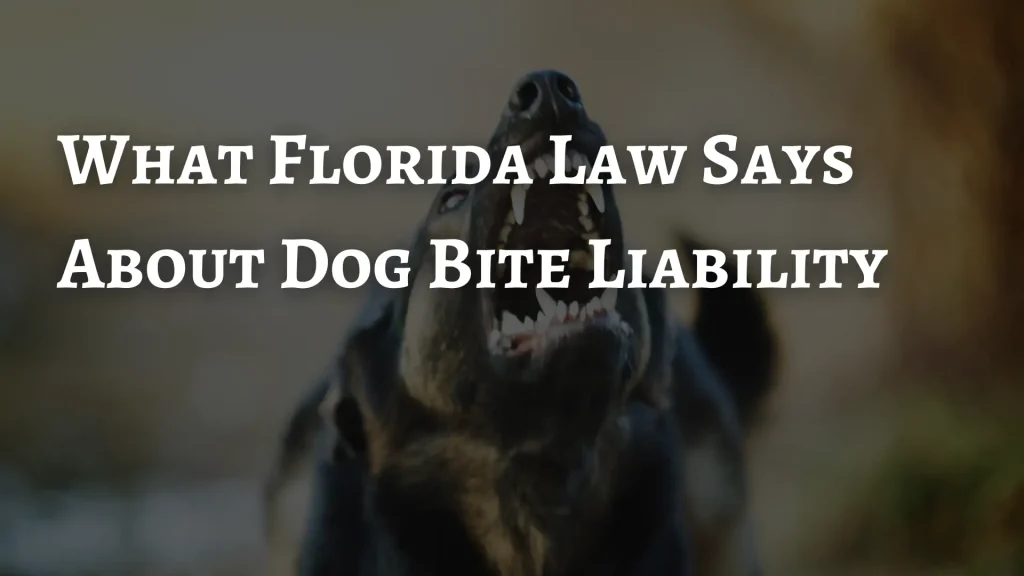 A dog bite can change the course of your day in the blink of an eye—calm turns to chaos, trust turns to fear, and suddenly, you’re headed to urgent care with more questions than answers. The physical pain is just one part of it. The medical bills, missed work, and emotional fallout often hit even harder. That’s why understanding dog bite injury liability premises is essential—it helps you know who may be responsible and how to seek the compensation you need to recover.
A dog bite can change the course of your day in the blink of an eye—calm turns to chaos, trust turns to fear, and suddenly, you’re headed to urgent care with more questions than answers. The physical pain is just one part of it. The medical bills, missed work, and emotional fallout often hit even harder. That’s why understanding dog bite injury liability premises is essential—it helps you know who may be responsible and how to seek the compensation you need to recover.
Dog bite lawyers in Fort Walton Beach handle these cases daily and know how often victims get blamed, dismissed, or lowballed. Florida law allows you to stand up for yourself, starting with knowing where dog bite injury liability begins.
Overview of Florida’s Dog Bite Liability Law
Florida has strict liability dog bite laws. That means a dog owner becomes responsible for bite injuries their pet causes, even if the dog never showed signs of aggression before. This applies whether the dog bit a stranger on the sidewalk or a visitor inside the owner’s home.
Florida Statutes §767.04 places full dog owner responsibility on the person who owns the dog, as long as the victim was lawfully on private or public property when the attack happened. Victims don’t need to prove negligence—only that the bite occurred and caused injury. This often creates a more straightforward path to recovery, especially for children or bystanders.
However, the law still includes some defenses. For example, if the owner displayed a warning sign on private property or the victim provoked the animal, the owner might reduce or avoid liability. These details matter when determining liability in dog bite cases, as they can significantly impact whether the owner is held entirely or partially responsible for the injury.
Where Florida Dog Bite Injuries Commonly Occur
Dog attacks can happen anywhere, but certain places carry a higher risk. Most dog bite legal claims involve one of the following locations:
- Neighborhoods and sidewalks: Loose dogs or leash law violations often lead to attacks in residential areas.
- Dog parks: Crowded, high-energy environments create the perfect conditions for misbehavior and bites.
- Apartment complexes: Shared spaces with unclear pet policies can complicate pet owners’ civil liability and raise questions about management responsibility.
- Friends’ or family homes: People often suffer bites from dogs they know, which makes the legal and emotional aspects more difficult.
An animal control report of the dog attack records what happened and when. A detailed report strengthens your claim and supports your version of events.
Compensation Available in Florida Dog Bite Cases
Injured victims can recover compensation for many losses in a dog bite personal injury lawsuit. Florida law allows injured parties to seek compensation for the following types of losses:
- Medical expenses, including surgery or infection treatment
- Lost income and missed work opportunities
- Pain and suffering, including long-term emotional trauma
- Disfigurement or permanent scarring
- Psychological treatment or trauma care
In the case of severe bites, compensation may also cover future procedures or long-term disability.
Victims often ask about proving dog owner negligence, but that’s not required under strict liability. Still, certain behaviors—like ignoring leash laws or failing to warn guests—can support claims for greater compensation.
Defenses in Dog Bite Cases
Florida law gives dog owners a few limited defenses. The most common is the provocation defense in a dog bite argument. The court may reduce or reject compensation if a victim hit, chased, or antagonized the dog before the bite. Judges weigh intent and behavior on both sides, and even partial provocation can impact the outcome.
Another defense involves trespassing. If the victim enters the property unlawfully, the owner may avoid liability for the premises. However, this doesn’t apply to public places or guests. Children and delivery workers often receive added legal protections in these cases.
Owners may also claim that the dog protected them or their property. However, these cases require strong evidence and often fail when dogs use excessive force. Courts rarely excuse attacks that go far beyond self-defense.
Other Forms of Liability for Dog Bites
Not every case falls cleanly under Florida’s dog bite statute. In some situations, victims may file claims under broader personal injury law. These include:
- Premises liability animal injury: If a landlord or property manager allowed a known aggressive dog on-site, they may share responsibility.
- Leash law violation bite case: Violating local leash laws can prove carelessness, especially in public parks or sidewalks.
- Injury caused by a pet: Traditional negligence rules apply if a dog knocks someone down without biting them.
Each situation carries different legal standards. An attorney can explain whether to proceed under Florida’s strict dog bite rules or file a standard negligence lawsuit.
Deadlines and Legal Rights for Dog Bite Victims
Victims must act quickly. Florida gives you two years to file a lawsuit based on negligence for a dog attack. You have four years to file a lawsuit based on the strict liability statute governing dog bites. In either case, waiting weakens your case. Evidence fades, witnesses forget details, and the dog owner may deny everything.
A fast response helps preserve:
- Medical records and photos of your injury
- Animal control or police reports
- Witness statements
- Vet records or prior complaints about the dog
Florida law protects the dog bite victim’s legal rights, but only if you take the first steps in time.
What to Do After a Dog Bite in Florida
 After a bite, prioritize your health and your legal protection. Here’s what to do:
After a bite, prioritize your health and your legal protection. Here’s what to do:
- Get medical treatment right away
- Report the attack to local animal control
- Identify the dog and its owner
- Take photos of the injuries and location
- Speak to a personal injury attorney as soon as possible
Do not accept blame or downplay what happened. Let professionals evaluate your legal options before dealing with the dog owner or their insurer.
Talk to a Florida Law Firm That Knows Dog Bite Injury Liability
At The Bruner Law Firm, we understand the’ severe physical and emotional cost of dog bites. Our team takes every case personally and works to hold negligent pet owners accountable. Whether you’re dealing with a leash law violation, a dangerous dog, or a landlord who looked the other way, we’re ready to help.
Call our dog bite lawyers in Fort Walton Beach today to discuss your dog bite injury liability case. We’ll review the details, explain your rights, and help you fight for your deserved compensation. Contact us online or call us today at (850) 243-2222.
Related Post
Understanding Liability in Slip and Fall Accidents in Florida







